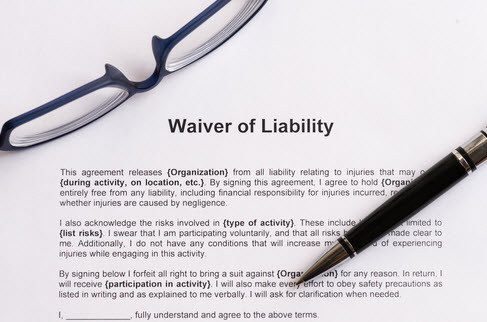Liability waivers are hard to avoid. Most companies and service providers require customers to sign liability waivers now, and many establishments, like theme parks and concert venues, have waivers that you agree to merely by purchasing a ticket or entering the venue. If you have suffered an injury, these waivers can seem like a dead-end for any kind of legal recourse. They’re often very long and full of hard-to-comprehend clauses that all seem to block you from moving forward. However, you are not without options. Merely enforcing a liability waiver does not ensure that companies are insulated from liability. In some cases, it may be possible to challenge or overturn the liability waiver, giving you the ability to receive compensation for your injuries.
Challenging Liability Waivers
Can you imagine if anyone who puts in writing that they can’t be held liable for harming others, actually couldn’t be held liable? Doesn’t exactly sound like a recipe for fairness and justice. And yet, that’s how most companies seem to believe liability waivers work. Luckily, those abusing waivers to cover their own negligence are in store for a rude awakening. No one can consent to illegal behavior, and companies and service-providers are still required to exercise reasonable care toward their clients. The clients cannot absolve the provider of the obligation to exercise reasonable care, even if it is explicitly put in writing. For this reason, waivers that absolve the provider of responsibility even for gross negligence and employee recklessness can be challenged, and will likely be overturned by the court.
Likewise, waivers that waive all liability can be challenged on the basis that they are overly broad. Overly-broad legal contracts cannot be enforced, because it’s unclear to the person signing exactly what rights they are giving up in exchange for partaking in the offered service. Waivers should be specific, for instance, “X Bowling Alley is not responsible for any lost or stolen property.” This phrase identifies the entity as well as what, specifically, the guest is giving up in exchange for the service (holding the establishment responsible in the event their property is lost or stolen). If the waiver instead stated, “By signing this document, I absolve X Bowling Alley of all liability,” this could, in theory absolve them of everything from negligence to identity theft. There’s no way for the individual signing to know what they may be giving up.
A Pennsylvania Personal Injury Lawyer Can Help
If you’ve been injured and are concerned that a liability waiver may be standing in the way of justice, our experienced personal injury lawyers want to help you get the compensation that you are legally entitled to. Just because you signed a piece of paper or bought a ticket, doesn’t mean that a company is off the hook for exercising reasonable care. If a party has acted negligently or recklessly, they should be held responsible. Schedule a free initial consultation with the personal injury attorneys at the O’Donnell Law Offices serving clients in Kingston, Wilkes Barre, Hazleton and Pittston at 570-821-5717 or online today. There is no fee or costs until we win your case.

